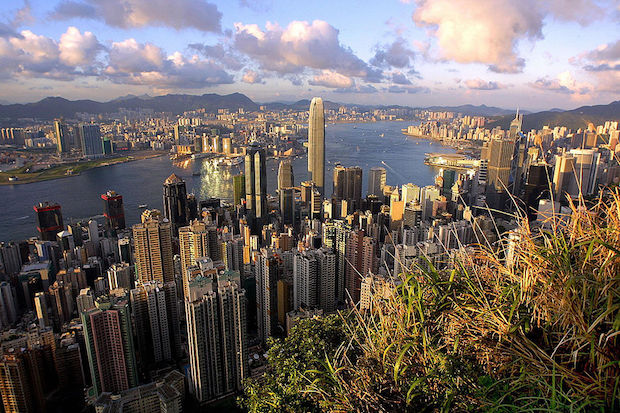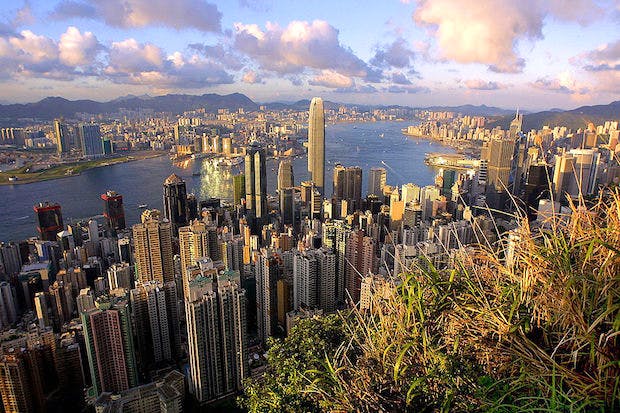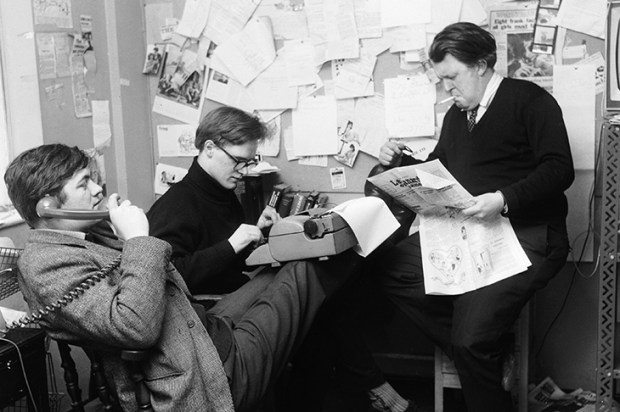Since he moved to Hong Kong three years ago, the Rat’s Cantonese has been coming on apace. This has rather less to do with his language skills — never that much in evidence on his school reports — than it does with the fact that my stepson works in what is still, despite the mainland Chinese’s best efforts, one of the most aggressively free-market cultures in the world.
‘It’s like this,’ Rat explained, when the Fawn and I visited earlier this year. ‘If you want to get a cab somewhere urgent in the morning and you can’t speak good enough Cantonese then basically you’re stuffed. The drivers just swear at you and drive off. They haven’t got time to be wasting listening to dumb Gweilo trying to make themselves understood. In Hong Kong time is money.’
This was the first time we’d seen the Rat and his girlfriend in their new home and it was a joy to see how much happier they were. Pleasing as well to hear them so ardently channelling my political views. You’d think living with me would be enough to turn any child left-wing. But hearing them going on about how much they loathed the feckless, scuzzy, dole-scrounging culture they’d left behind them in Camberwell, I almost felt like Jeremy Corbyn listening to a treatise by Nigel Farage.
They’re dead right, though, of course. In London, they were just scrabbling to no real purpose. Neither was earning enough to save even for holidays, let alone accumulate sufficient capital to get a place on the property ladder. Now, they can afford to go on long-weekend jaunts to Thailand and the Philippines, eat out whenever they wish and still put money aside for a home for all the beautiful grandchildren they’re going to make us now that they’ve just got married.
Really, it all comes down to tax. In Hong Kong, your property rental is at least as hideously as expensive as in London. The big difference is, you’re not handing over up to 45 per cent of your earnings to the taxman. Even the top income tax rate in Hong Kong is just 17 per cent — but, of course, the Rat pays much less than that. Some companies pay you for a 13-month year so that effectively you’re paying almost zero tax. Throw in an incredibly cheap and efficient public transport system, fantastic food and lots of gorgeous tropical locations to fly to whenever there’s time, and you can see why people find the living in Hong Kong so very attractive.
There are downsides. When Rat first moved there he was shocked to see in the small hours of the morning very elderly people doing menial tasks such as lugging around cardboard boxes. He offered to help one once and was angrily waved away. ‘This is the culture here. It seems harsh but they don’t like you interfering because that’s the way they do things. If you don’t work you don’t eat.’
After you’ve been in Hong Kong for a few days, you start to realise how incorrigibly, nauseatingly socialistic most western nations are. Notice, for example, how in the recent grammar school debate almost every argument, even from within the Conservative party, was couched in terms of how much damage might be done to the children who missed out. Barely anyone — a brave Quentin Letts on Question Time was one of the few — dared make the point that actually it might be good if parents got more freedom of choice as to where to educate their kids and that brighter children might benefit greatly from studying among their intellectual equals.
It’s quite possible that Hong Kong, too, might have been infected by this kind of thinking. Fortunately, it was spared at a crucial point by one of empire’s greatest unsung heroes: John Cowperthwaite, the colonial administrator who deserves much of the credit for Hong Kong’s transformation from one of the poorest places on earth to one of the most prosperous.
Cowperthwaite was the colony’s financial secretary from 1961 to 1971. He was also, as luck would have it, an ardent classic liberal who believed economies do best with minimal government intervention. To this end, he refused to collect economic statistics, which he believed only served to encourage meddling. On his watch — and in the teeth of opposition from his superiors, many of a big-government persuasion — taxes stayed low, government spending and red tape were kept to a minimum, employment laws remained lax and the economy grew like Topsy.
To the left, successes like Hong Kong will always be anathema. You can just imagine a more ‘enlightened’ European-style administration trying to solve that taxi ‘problem’ I mentioned at the beginning with a raft of new initiatives: compulsory basic English lessons for drivers; a ban on taxis turning down passengers no matter how poor their Cantonese; a leaflet and ad campaign, in several languages, informing taxi users of their rights; a team of inspectors to enforce the new rules…
One of the many problems with socialists is that they never stop to consider what unintended consequences might result from their virtuous interventions. And because they’re so busy trying to generate equality by bringing everyone down to the level of the lowest common denominator, it never occurs to them how much damage they’re doing to the potential of young people like the Rat.
In London, I’ve no doubt the Rat would be doing well enough. But moving to the red-in-tooth-and-claw free-market environment of Hong Kong has transformed him. He works harder; he thinks more tactically and strategically; he has a better future because he knows that when his payback comes, he won’t have to hand back his well-deserved gains to some ungrateful scrounger. This could be Britain’s post-Brexit future, too: I just hope we have the courage and enlightened ruthlessness to seize the opportunity.
The post The miracle of Hong Kong appeared first on The Spectator.
Got something to add? Join the discussion and comment below.
Get 10 issues for just $10
Subscribe to The Spectator Australia today for the next 10 magazine issues, plus full online access, for just $10.
You might disagree with half of it, but you’ll enjoy reading all of it. Try your first month for free, then just $2 a week for the remainder of your first year.















Comments
Don't miss out
Join the conversation with other Spectator Australia readers. Subscribe to leave a comment.
SUBSCRIBEAlready a subscriber? Log in